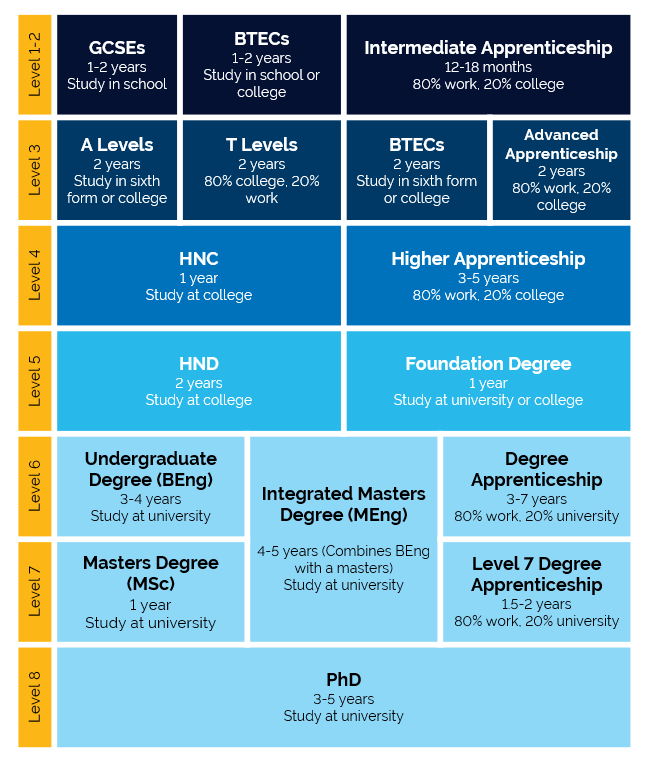Pathways into Electrification
Exploring a career in Electrification offers exciting possibilities, but it’s important to know that there isn’t just one path to follow. Now, more than ever, there are alternative routes and qualifications available.
Three of the pathways you may consider, after you've completed your GCSEs are:
- Pursuing an apprenticeship while working
- Studying A Levels, including Maths and Physics at sixth form or college
- Studying for T Level at sixth form or college
However, these are not the only routes. You could also study for qualifications such as BTECs and HNCs. These options can all lead to a variety of further study and work.

Level 3 Qualifications
Level 3 Qualifications are the next level up from GCSEs. You can complete these in sixth form or college. Level 3 qualifications include:
A Levels
- Classroom based, study at sixth form or college.
- Assessed through exams and coursework.
- Study 3-4 subjects.
- Maths and Physics are usually required for engineering courses at university.
- Further Maths, Computer Science and Electronics can also be helpful for a career in electrification.
T Levels
- 80% of time spent studying in a classroom, 20% in the workplace.
- 2 years to complete.
- Study one subject.
- Subjects linked to electrification include:
- Design and Development for Engineering and Manufacturing
- Engineering, Manufacturing, Processing and Control
Advanced Apprenticeships
- Work-based qualification, earn while you learn.
- 80% of time spent with an employer, 20% of time spent studying in college.
- Typically takes 2 years to complete.
- Apply to employer, rather than the college.
BTECs, NVQs and other Level 3 qualifications are also available.
Level 4 - 5 Qualifications
Level 4 and 5 Qualifications usually require a level three qualification.
Higher National Certificated (HNC)
- Level 4 qualification.
- Practical-based, study at college.
- Takes 1 year to complete full-time or 2 years part-time.
Higher National Diploma (HND)
- Level 5 qualification.
- Practical-based, study at college.
- Takes 2 years to complete full-time or 3-4 years part-time.
Higher Apprenticeship
- Work-based qualification, earn while you learn.
- 80% of time spent with an employer, 20% of time spent studying in college.
- Typically takes 3-5 years to complete.
- Apply to employer, rather than the college.
Foundation Degree
- Level 5 qualification.
- One-year course, stepping-stone to an undergraduate degree programme.
- Designed for students who haven’t studied enough maths content at Level 3 but want to study an engineering degree.
Level 6 - 7 Qualifications
Undergraduate Degree (Level 6)
- 3 years full-time for a Bachelors of Engineering (BEng).
- An Engineering degree will involve lectures, small group tutorials, lab sessions and real world case studies.
- Optional placement year working in industry.
- Courses that can lead to a career in electrification include:
Degree Apprenticeship (Level 6)
- Work-based qualification, earn while you learn.
- 80% of time spent with an employer, 20% of time spent studying in college.
- Typically takes 3-7 years to complete.
- Apply to employer, rather than the college.
- Courses that can are related to electrification:
Integrated Master's Degree (Level 6-7)
- 4 years full-time for a Master's of Engineering (MEng).
- The first 3 years is equivalent to an undergraduate degree and the final year is equivalent to a Master's degree.
- Optional placement year working in industry.
- Courses that can lead to a career in electrification include:
Master's Degree (Level 7)
- Requires an undergraduate degree.
- Takes one year to complete.
- Courses related to electrification include:
Which pathway is right for you?
Only you can decide which pathway is the correct one for you. If you enjoy studying, you may prefer the traditional route of A Levels (including Maths) and then a traditional university degree. If you prefer to be more hands-on in your learning and put your skills into practice as you go, then T Levels or apprenticeships might be more suitable. If you are worried about student loans or funding university, or would prefer to earn a wage throughout your studies, consider apprenticeships.
